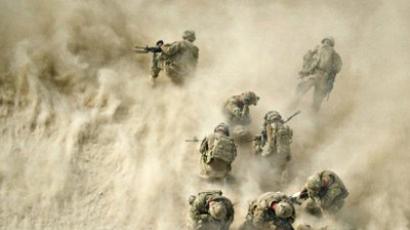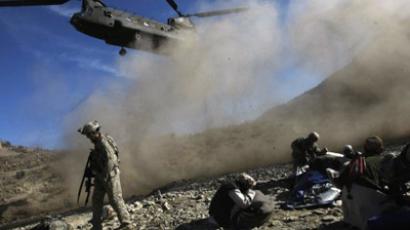US in Afghanistan: no signs of departure
After sending an extra 30,000 troops to Afghanistan last year, President Obama pledged to start bringing them home this year. But a combat mission started there a decade ago has now transformed into an open-ended campaign with an uncertain end date.
On the eve of 10th anniversary of the invasion to topple the Taliban, General Stanley McChrystal, former commander of coalition forces in Afghanistan, has harshly criticized the US’s country's campaign in Afghanistan.He said that the US and NATO are only "50 per cent of the way" towards achieving their goals in Afghanistan."We didn't know enough and we still don't know enough. Most of us, me included, had a very superficial understanding of the situation and history, and we had a frighteningly simplistic view of recent history, the last 50 years," he said.With Afghan forces struggling to stand alone, it is likely that fewer US troops will leave than planned and American bases are not going to shrink anytime soon.American troops are going to stay well beyond 2014, the much trumpeted deadline given by President Obama, according to Washington's top military commander there, General John R. Allen.With Afghan forces struggling to stand alone, it is likely that fewer US troops will leave than planned and American bases are not going to shrink anytime soon.American troops are going to stay well beyond 2014, the much trumpeted deadline given by President Obama, according to Washington's top military commander there, General John R. Allen.
In November 2010 President Barack Obama claimed the US would end its combat mission in Afghanistan and transfer security responsibility to Afghan security forces by 2014. He promised to reduce significantly the number of US troops deployed there starting in July 2011. Obama planned to withdraw about 10,000 American troops by the end of 2011. However, in October 2011 the number of US troops in Afhanistan reached 94,000.
When US-led forces overran the Taliban in late 2001, Bagram Air Field was little more than a flight tower and a cracked runway.Since then, the former Soviet base in the plains north of the Afghan capital has grown into a small city that is home to over 25,000 full-time personnel, fleets of military and cargo aircraft, and enough vehicles to cause traffic jams.And an expansion is now underway.Aided by scores of contractors, US military engineers are constructing new housing and storage facilities to make room for even more military personnel and hardware.At least there are plenty of home comforts for soldiers on tough, yearlong deployments – surreal as they might be.They can shop for everything from magazines to jewelry, enjoy a cappuccino, or grab some take-out at the new Pizza Hut franchise.And if they are tired of working out in the gym, they are free to go to the salon for a haircut and massage.Although some officials have tried to limit such amenities, calling them a distraction from the war, the troops are happy to have them.“These are extremely important. Soldiers always need an opportunity to do two things: relax, and have a taste of home, something that reminds them of home,” Lisa Bryan, US army chief warrant offer says.Local Afghan merchants are also glad to have the extra business, both inside and outside the wire.“Without Bagram and the soldiers my business would be nothing. We like having them here,” says the local butcher Mukhtar Ahmad.But not everyone agrees.Deadly Taliban rocket attacks are on the rise. And as the base becomes more and more crowded, the threat to those living inside its walls multiplies – no matter how high they become.“Every rocket’s a close call when you’re this congested, you know, you got this much equipment, personnel consolidated into one tight spot…you get it close it is going to destroy something or someone,” US Army Sgt. Jeffrey Graham says.Easy as it may be to forget at times, this is a war zone.














